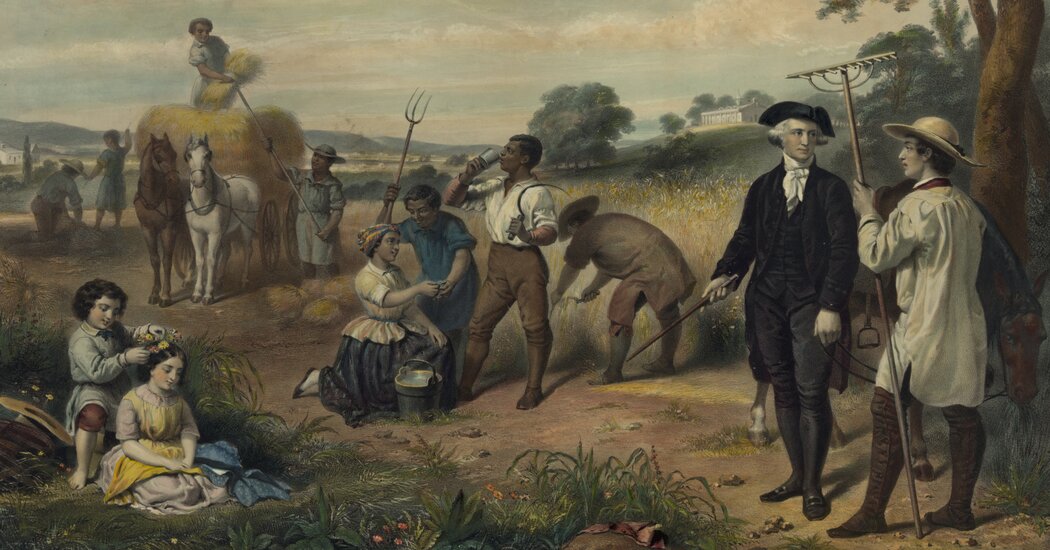THE GREAT CONTRADICTION: The Tragic Side of the American Founding, by Joseph J. Ellis
Framed on the wall of my office is a quote from a letter written to George Washington in 1785 by Robert Pleasants, a fellow tobacco planter, and the ancestor of some friends of mine. Unlike Washington, Pleasants, a Quaker, had freed his enslaved workers as soon as Virginia law allowed him to do so. “Remember the cause for which thou wert call’d to the Command of the American Army, was the cause of Liberty and the Rights of Mankind,” Pleasants chided the retired general, reminding him of the irony that many who had recently fought for freedom were now sitting “in a state of ease, dissipation and extravagance on the labour of Slaves.”
A fierce debate has raged in recent years over the flaws in America’s founding. Was the nation fatally compromised at its birth by the institution of slavery (and by the dispossession of Native Americans)? Or do such claims, themselves based on the egalitarian principles of the Revolution, overlook the founders’ achievements, the obstacles they faced in achieving more and the progress the nation has made since? Would we, in their place, have done any better?
Now Joseph J. Ellis, the Pulitzer Prize-winning historian of the Revolutionary era, known for generally positive accounts of its leading figures, enters the debate with “The Great Contradiction,” a slim book in which he promises to forthrightly address “two unquestionably horrific tragedies the founders oversaw: the failure to end slavery, and the failure to avoid Indian removal.”
The American Revolution disrupted slavery in ways the founders never anticipated. Thousands of enslaved people fled to fight for the British, a phenomenon Ellis strikingly calls “the purest form of The Cause, for its truths truly were self-evident.” In Charleston, S.C., meanwhile, patriots refused to arm enslaved men in exchange for freedom, forcing the city’s surrender to the British in 1780. (Depriving others of liberty mattered more than securing their own.) In the North, a robust abolition movement successfully pushed to ban the practice outright in several states.
Pleasants, whose letter Ellis cites, was far from the only person to notice the contradiction. Some of the founders made such connections themselves. Washington, who had owned people since he was 11 years old, warned that by imposing new taxes the British were seeking to make the colonists “as tame, & abject Slaves, as the Blacks we rule over with such arbitrary Sway.” After the war, Washington fumed when British ships carried off enslaved servants who had fled Mount Vernon. “He was not numb to the larger moral issues at stake,” Ellis writes, “but such concerns still floated above the palpable and almost primal conviction that his slaves belonged to him.”
Straining to hold their ideals and practices in uneasy balance, the founders contorted themselves in absurd ways. James Madison, adept at what Ellis calls “enlightened obfuscation,” might start a sentence by criticizing slavery but end it by hiding behind “a verbal fog bank that descends over the entire subject like a cloud.” In 1790, Madison called slavery “a moral and political evil” but deemed it “improper” to push for abolition at that moment. The right one never came, though he lived another 46 years.
Early on, Ellis unhelpfully describes today’s roiling debate over the founding as occurring between “pro-American” and “anti-American” factions. “Both sides think more like lawyers than historians,” he writes. But in “The Great Contradiction” he, too, seems to approach the work as an attorney — defense counsel in a capital trial who raises every mitigating circumstance he can think of to keep his clients out of the electric chair.
Ellis argues that the Revolution’s leaders were well-meaning prisoners of circumstance. They could not have abolished slavery had they wanted to, and pushing for it would have divided the fragile Union. Even many who advocated for emancipation (though not Pleasants) wanted to force freed Black people to leave the country — an increasingly impossible task as the enslaved population grew. That dilemma, in addition to slavery’s rapid expansion, stalled any resolution, turning at least some of the founders’ hopes that slavery would eventually disappear on its own into decades of paralysis, broken only by the Civil War.
Throughout the book, Ellis stacks the deck in subtle but consequential ways. In the sole chapter on the forced expulsion of Native peoples from their homelands, he downplays Washington’s lifelong involvement (and investment) in the project of settler expansion. His 1779 order for the “total destruction and devastation” of Iroquois villages goes unmentioned, for instance.
Instead, “The Great Contradiction” presents Washington as powerless to obstruct the “relentless tide” of white settlers venturing westward. Ellis focuses on a brief moment in the early 1790s when Washington and other leaders — “because the revolutionary fires still burned inside them” — tried to adopt a gentler approach toward the Creek nation of what’s now Georgia, Alabama and Mississippi. Largely ignoring the violent war American soldiers were then waging against nations aligned in a northwestern Indian confederacy across Ohio and Indiana, Ellis prefers to depict Creek chiefs locking arms with the president and chanting a song “about perpetual peace.”
This is a bizarrely evasive way to explore “the downside of the American founding.” But such instances of special pleading and selective treatment point to a larger problem with the book: Seeing the perpetuation of slavery and the acceleration of Indian removal as “failures” ignores how, for those committed to bondage and conquest, the Revolution was, in practice, a triumph.
THE GREAT CONTRADICTION: The Tragic Side of the American Founding | By Joseph J. Ellis | Knopf | 226 pp. | $31
The post Joseph J. Ellis Doesn’t Think You Would Have Abolished Slavery, Either appeared first on New York Times.




